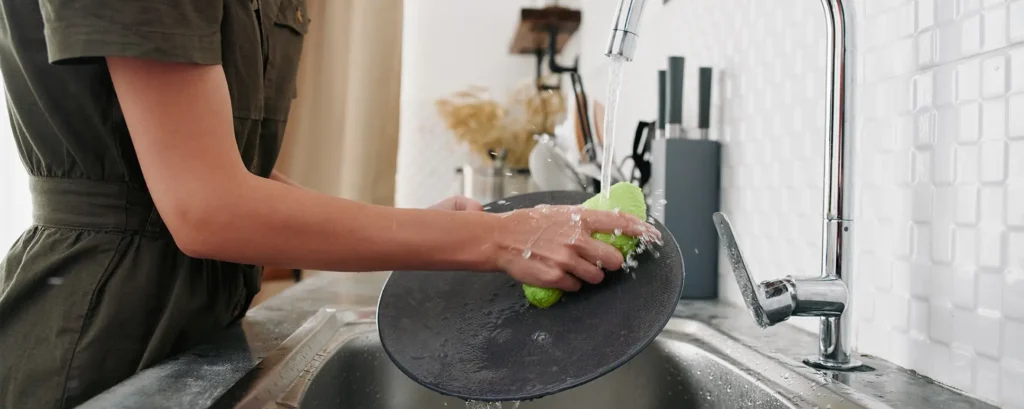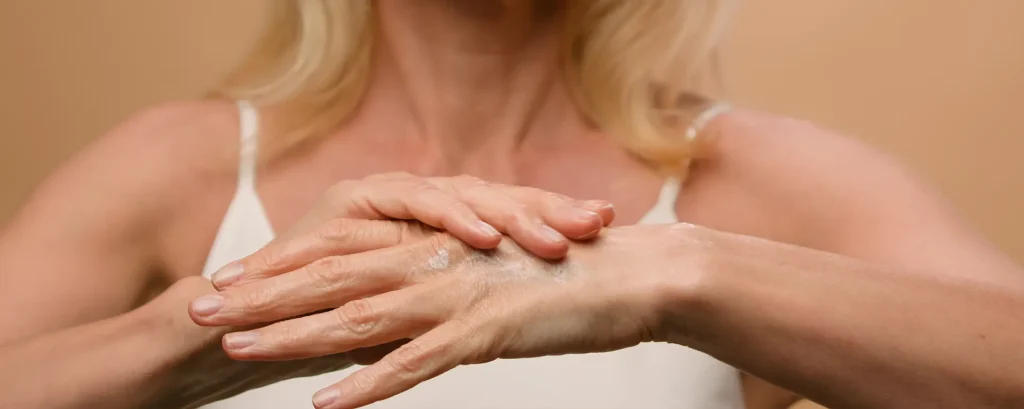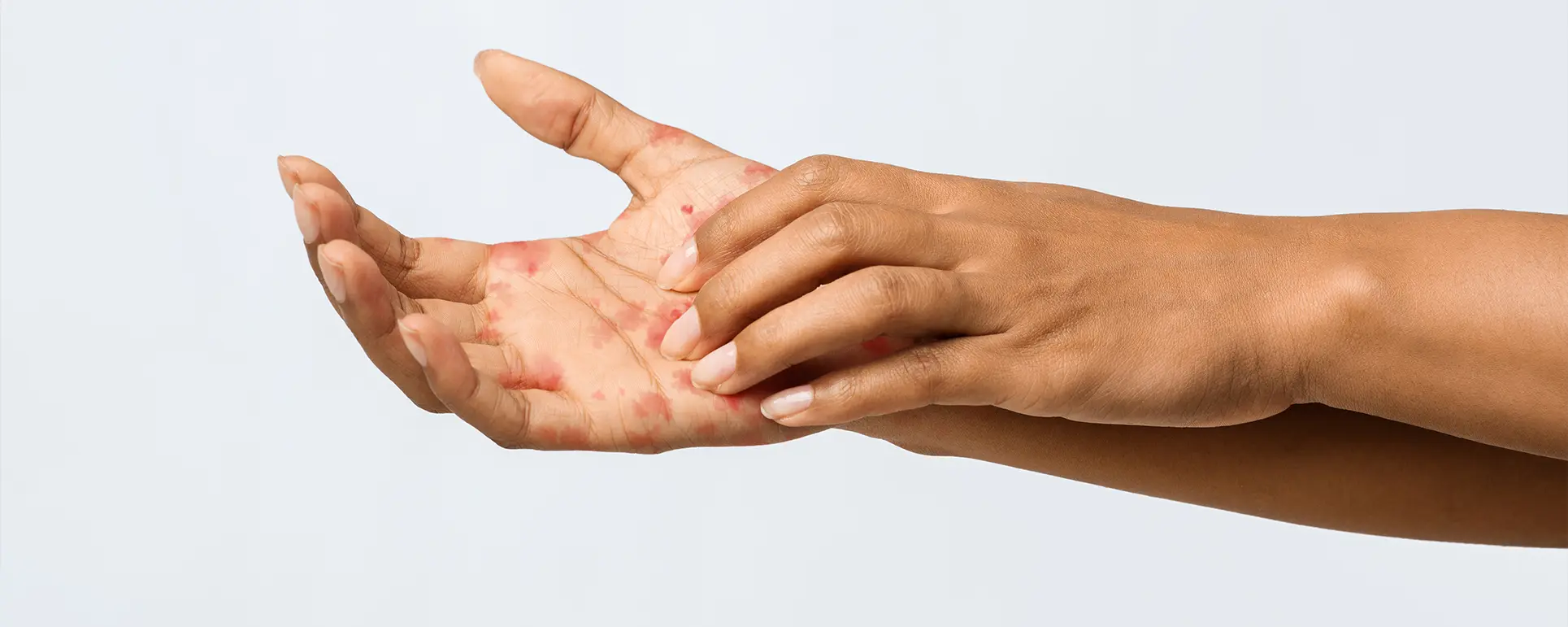Have you ever noticed your hands becoming itchy, red, or dry after washing dishes? You’re not alone. For many people, this is a daily irritation that turns a simple household task into an uncomfortable experience.
While it might seem harmless, that post-dishwashing itch could be a sign of contact dermatitis a type of skin inflammation triggered by frequent exposure to detergents, hot water, and even the friction of scrubbing.
In this guide, we’ll explore why your hands react this way, what’s happening to your skin barrier, and most importantly how you can prevent and treat it using dermatologist-approved methods.
Why Dishwashing Causes Itchy Hands
Your skin has a natural protective layer made up of oils and lipids that keep it moisturised and shielded from irritants. When you wash dishes repeatedly, especially without gloves, several things happen at once:
- Hot water strips natural oils, drying out the skin.
- Detergents and soaps break down your skin barrier, making it more sensitive.
- Friction and scrubbing create micro-abrasions that allow irritants to penetrate deeper.
The result? Itching, redness, tightness, or even small cracks on the skin. Over time, this can progress into chronic dermatitis if left untreated.
The Role of Detergents
Dishwashing liquids are designed to remove grease and grime but they’re also highly effective at removing your skin’s natural oils.
Most detergents contain surfactants such as sodium lauryl sulphate (SLS) or sodium laureth sulphate (SLES). These ingredients lower the surface tension of water, helping it dissolve grease but they also disrupt the lipid layer of your skin.
Once your skin barrier is compromised, moisture escapes more easily, and irritants can penetrate. This leads to inflammation, dryness, and that familiar itchy sensation.
Even “mild” or “eco-friendly” dishwashing liquids can cause reactions in sensitive individuals, especially with prolonged contact.
The Effect of Hot Water

Many people wash dishes using hot or very warm water thinking it helps clean more effectively. While that’s true for grease, it’s not great for your skin.
Hot water causes:
- Dehydration of the outer skin layers (epidermis)
- Softening and swelling of skin cells, making them more vulnerable to irritation
- Increased stripping of oils from the surface
When combined with detergent exposure, hot water accelerates the breakdown of your skin barrier. That’s why even a few minutes of dishwashing can leave your hands feeling tight or itchy.
Understanding Contact Dermatitis
If you often experience itching, redness, or peeling after washing dishes, you might be dealing with contact dermatitis an umbrella term for skin irritation caused by contact with a substance.
There are two main types:
1. Irritant Contact Dermatitis (ICD)
This is the most common form and occurs when a substance like detergent, soap, or water directly damages the skin barrier.
Symptoms include:
- Dry, rough skin
- Burning or stinging sensation
- Itchiness
- Redness and cracking
ICD can develop gradually from repeated exposure, which is why dishwashing is a frequent trigger.
2. Allergic Contact Dermatitis (ACD)
In this type, your immune system overreacts to a particular ingredient, treating it like an allergen. Common culprits in dish soaps include preservatives, fragrances, and colourants.
Symptoms include:
- Itchy rashes or bumps
- Swelling
- Blistering in severe cases
If you suspect an allergy, you may need a patch test at an Allergy Clinic in London to identify the specific trigger.
Signs Your Skin Barrier Is Damaged

Your skin barrier acts like a protective wall that keeps moisture in and irritants out. When that wall is compromised, you’ll notice several tell-tale signs:
- Persistent dryness or tightness
- Peeling or flaking
- Sensitivity to soaps and water
- Burning or itching after washing
- Small cracks or rough patches
If this happens frequently, your skin needs more than just lotion it needs repair and protection.
Who’s Most at Risk?
While anyone can develop itchy hands from washing dishes, some people are more vulnerable, including:
- Those who wash dishes frequently (chefs, caterers, cleaners).
- People with eczema or sensitive skin.
- Individuals prone to allergies or asthma.
- People who skip gloves or use hot water regularly.
Your genetics and existing skin conditions can also increase susceptibility.
How to Prevent Itchy Hands When Washing Dishes
The good news? With a few simple changes, you can protect your skin and stop the itching altogether.
Let’s go through dermatologist-approved tips to prevent irritation.
1. Wear Gloves Always
It might sound obvious, but gloves are your first line of defence. Choose nitrile or rubber gloves lined with cotton for comfort.
Avoid latex if you have sensitivities, as latex can itself trigger allergic dermatitis.
Pro Tip:
If your hands sweat inside the gloves, apply a thin layer of barrier cream or wear lightweight cotton liners to absorb moisture.
2. Switch to Mild, Fragrance-Free Detergents
Look for dishwashing liquids labelled:
- “Fragrance-free”
- “Hypoallergenic”
- “Dermatologist-tested”
Avoid products with harsh surfactants or strong scents. Brands formulated for sensitive skin or babies tend to be gentler.
Even better, try diluting your detergent most people use far more soap than necessary.
3. Use Lukewarm Water Instead of Hot
Warm water cleans just as effectively but is much kinder to your skin.
Cooler temperatures reduce dehydration and minimise the stripping of protective oils.
4. Moisturise Immediately After Washing
After finishing your dishes, pat your hands dry (don’t rub) and apply a rich, fragrance-free hand cream while your skin is still slightly damp.
This locks in moisture and helps rebuild the lipid barrier.
Look for ingredients such as:
- Ceramides
- Shea butter
- Glycerin
- Hyaluronic acid
- Urea (for very dry hands)
Keep a small tube of hand cream by the sink as a reminder to apply it every time you wash dishes.
5. Apply a Barrier Cream Before Washing
A barrier cream forms a thin protective film over your skin, reducing contact with irritants.
Apply it 10–15 minutes before washing up to let it absorb properly.
Dermatologists often recommend products with dimethicone or zinc oxide for this purpose.
6. Avoid Prolonged Soaking
Letting your hands sit in hot, soapy water for long periods is one of the fastest ways to damage your skin.
If you have a lot of dishes, try soaking them first and then washing them quickly while wearing gloves.
7. Gently Cleanse Hands After Dishwashing
After you’re done, rinse your hands with plain water to remove any lingering soap or detergent.
Avoid using antibacterial or perfumed hand washes immediately after dishwashing, as your skin is already sensitive.
When the Itching Doesn’t Go Away
If your hands continue to feel itchy, cracked, or inflamed even after taking precautions, it’s time to seek professional help.
You might have developed chronic hand dermatitis a condition that requires targeted medical treatment.
At an Allergy Clinic in London, dermatologists can perform patch testing to determine whether your symptoms stem from irritant contact dermatitis, allergic reactions, or an underlying skin disorder like eczema.
Medical Treatments and Prescriptions
Depending on your diagnosis, a dermatologist may recommend one or more of the following treatments:
1. Topical Steroids
These reduce inflammation and itching quickly. They come in varying strengths depending on the severity of your symptoms.
2. Emollient Therapy
Emollients restore the skin barrier. You may be prescribed thicker creams or ointments to use several times a day.
3. Calcineurin Inhibitors
Non-steroid creams like tacrolimus or pimecrolimus can be used for long-term management, especially if steroids aren’t suitable.
4. Antihistamines
For severe itching, oral antihistamines can provide relief and reduce allergic responses.
5. Phototherapy (Light Treatment)
In chronic cases, controlled UV light therapy may be used to calm inflammation and help the skin heal.
6. Allergen Avoidance Plan
If patch testing reveals a specific allergen, your dermatologist will help you avoid or replace the offending products.
Home Remedies That Can Help
While professional treatment is crucial for chronic cases, you can also support your skin at home.
1. Oatmeal Soak
Add a handful of colloidal oatmeal to lukewarm water and soak your hands for 10 minutes. Oatmeal has anti-inflammatory and soothing properties.
2. Aloe Vera Gel
Pure aloe vera cools and calms irritated skin. Choose 100% natural gels without alcohol or fragrance.
3. Coconut Oil
Rich in fatty acids, coconut oil helps restore your skin barrier. Apply before bed and wear cotton gloves overnight.
4. Petroleum Jelly
A simple yet effective way to lock in moisture. Use it after applying your hand cream for extra protection.
Can Washing Dishes Cause an Allergy?
Yes in some cases, repeated exposure to dishwashing liquids can lead to allergic contact dermatitis.
Common allergenic ingredients include:
- Fragrances and perfumes
- Preservatives (like methylisothiazolinone)
- Colourants
- Enzymes or antibacterial additives
If your symptoms appear even after short contact or worsen over time, it’s likely an allergic reaction rather than simple irritation.
A specialist can confirm this through patch testing and guide you toward hypoallergenic alternatives.
The Importance of Repairing the Skin Barrier
Think of your skin barrier as the roof protecting your house. When it’s intact, your skin stays hydrated and healthy. When it’s damaged, moisture escapes and irritants sneak in causing inflammation and discomfort.
Rebuilding this barrier takes time, consistency, and the right products.
Steps to repair the barrier:
- Stop using harsh soaps or detergents on bare skin.
- Moisturise multiple times a day.
- Avoid unnecessary exfoliation.
- Sleep with hand cream and gloves at night for deep repair.
- Stay hydrated and eat omega-rich foods to support skin health from within.
Preventing Future Flare-Ups
Once your hands have healed, maintaining healthy habits is key to preventing recurrence.
Here’s what dermatologists recommend for long-term prevention:
- Keep multiple hand creams in different locations (kitchen, bathroom, handbag).
- Reapply moisturiser after every wash or cleaning session.
- Use gloves for all wet work not just dishwashing.
- Rotate detergents occasionally to prevent sensitivity build-up.
- Keep nails trimmed short to avoid harbouring irritants under them.
Simple consistency goes a long way toward keeping your hands soft, healthy, and itch-free.
When to See a Dermatologist
You should seek professional help if:
- Itching or redness persists longer than a week.
- Cracks or blisters appear.
- You notice spreading rashes beyond your hands.
- Over-the-counter creams provide little relief.
Chronic dermatitis can worsen without treatment, leading to infections or scarring but with early intervention, it’s easily managed.
An experienced dermatologist or allergy specialist can pinpoint your triggers and design a care plan to restore your skin barrier effectively.
FAQs:
1. Why do my hands get itchy immediately after washing dishes?
You may notice itching right after washing dishes because your skin’s natural protective oils are stripped away by hot water and detergents. This weakens your skin barrier, allowing irritants to penetrate and trigger inflammation. Even a short exposure can leave your hands feeling tight, dry, and itchy, especially if you have naturally sensitive skin or existing conditions like eczema.
2. Can mild or eco-friendly dish soaps still irritate my skin?
Yes, even “mild” or eco-friendly detergents can cause reactions if your skin is sensitive or if you wash dishes frequently. These products may have gentler ingredients, but repeated exposure can still remove oils, weaken the barrier, and trigger dryness or itching over time. Your hands respond to cumulative irritation rather than just a single wash.
3. Is hot water really worse for my skin than cold or lukewarm water?
Absolutely. Hot water accelerates the loss of natural oils and dehydrates the outer skin layers, leaving your hands more vulnerable to irritation. Lukewarm water is just as effective at cleaning dishes but is much kinder to your skin, helping to reduce redness, tightness, and itching. Over time, switching to cooler water can make a noticeable difference in comfort.
4. How can I tell if my itchy hands are caused by irritation or an allergy?
If your hands become itchy, red, or dry gradually after repeated exposure, it’s likely irritant contact dermatitis caused by detergents and water. Allergic contact dermatitis, on the other hand, usually appears even after brief contact with a specific ingredient like a fragrance or preservative, and may include swelling, bumps, or blistering. If you suspect an allergy, a dermatologist can perform patch testing to identify the exact trigger.
5. Can wearing gloves prevent my hands from getting itchy?
Wearing gloves is one of the best ways to protect your hands, as they create a barrier between your skin and irritants. However, it’s important to choose the right type of gloves. Nitrile or cotton-lined rubber gloves are usually safest, while latex can sometimes trigger allergies. You also want to make sure your hands don’t sweat excessively inside the gloves, as trapped moisture can worsen irritation.
6. How should I moisturise my hands after washing dishes?
Moisturising immediately after washing is essential. You should pat your hands dry instead of rubbing them and apply a rich, fragrance-free hand cream while your skin is still slightly damp. Ingredients like ceramides, shea butter, glycerin, or hyaluronic acid help lock in moisture and restore the skin barrier. Consistency matters making this a routine after every wash can significantly improve comfort over time.
7. Are there any home remedies that actually help soothe itchy hands?
Yes, certain home remedies can complement your professional care routine. Oatmeal soaks, for instance, provide anti-inflammatory benefits and calm irritated skin. Pure aloe vera gel offers cooling relief, while coconut oil and petroleum jelly can restore moisture and protect your barrier overnight. These methods work best when combined with proper prevention, like wearing gloves and using gentle detergents.
8. Can repeated dishwashing permanently damage my skin?
Frequent exposure to detergents, hot water, and scrubbing can lead to chronic hand dermatitis if left untreated. Your skin barrier becomes progressively weaker, which increases sensitivity and the risk of cracking, infection, or prolonged dryness. By protecting your hands with gloves, using mild detergents, and consistently moisturising, you can prevent permanent damage and maintain healthy skin.
9. How do I know when it’s time to see a dermatologist?
You should consult a dermatologist if your itching, redness, or dryness persists despite taking preventative measures. Cracks, blisters, or spreading rashes are signs that your skin needs professional intervention. A dermatologist can identify whether you’re dealing with irritant or allergic contact dermatitis, recommend prescription treatments, and create a plan to restore your skin barrier effectively.
10. Can lifestyle changes help reduce flare-ups?
Absolutely. Simple adjustments like keeping hand creams nearby, reapplying moisturiser after every wash, using gloves consistently, and avoiding prolonged exposure to harsh soaps can make a huge difference. Eating a diet rich in omega fatty acids and staying hydrated also supports your skin from within. Over time, these small habits can dramatically reduce flare-ups and keep your hands comfortable and healthy.
Final Thoughts: How to Keep Your Hands Healthy After Dishwashing
Itchy, dry hands after washing dishes can be frustrating, especially when it affects your daily routine. While simple changes like wearing gloves, using gentle detergents, and moisturising consistently can help, persistent irritation may indicate a more serious issue, such as allergic contact dermatitis or chronic hand dermatitis.
If you notice ongoing redness, itching, or cracking despite taking precautions, consulting a specialist is the best step. You can get in touch with us to book a consultation with our Allergy Clinic in London, where dermatologists can accurately identify whether your symptoms are caused by irritants, allergens, or an underlying skin condition. They will then create a personalised plan to repair your skin barrier and prevent future flare-ups. Taking this step can help you restore comfort, protect your hands long-term, and confidently carry out daily tasks without discomfort.
References:
1. Masutani, Y., 2022. Skin treatment with detergent induces dermatitis with H1-receptor activation. Frontiers in Pharmacology, 13, p. 967787. Available at: https://pmc.ncbi.nlm.nih.gov/articles/PMC9677871/
2. Rinaldi, A.O., 2024. Household laundry detergents disrupt barrier integrity and promote inflammation in human skin. Scientific Reports, 14(1), p. 37766519. Available at: https://pubmed.ncbi.nlm.nih.gov/37766519/
3. Magnano, M., 2009. Contact allergens and irritants in household washing and cleaning products. Contact Dermatitis, 61(4), pp. 229–234. Available at: https://pubmed.ncbi.nlm.nih.gov/20059494/
4. Masutani, Y., 2022. Skin treatment with detergent induces dermatitis with H1-receptor activation. Frontiers in Pharmacology, 13, p. 823535. Available at: https://pmc.ncbi.nlm.nih.gov/articles/PMC9677871/
5. National Health Service (NHS), 2025. Causes of contact dermatitis. Available at: https://www.nhs.uk/conditions/contact-dermatitis/causes/
